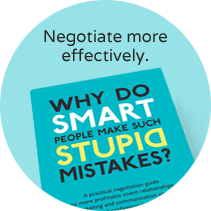Insights

What can agencies learn from the Great British Bake Off negotiations?
So we’ve just had the final episode of the Great British Bake Off on the BBC. The GBBO has been incredibly successful attracting viewing figures of nearly 15,000,000. The three year contract with the BBC terminates at the end of 2016. The idea for the show is owned by Love Productions. Love Productions asked the BBC for £25m per year for the next 3 years. This is apparently four times what was previously paid. Their rationale was simple: it delivers the highest audience on TV and should be rewarded accordingly. Channel 4 agreed to the £25m. The BBC offered £15m per year which is 2.5 times the previous price. The BBC argued GBBO isn’t expensive to make “being filmed in a tent in Berkshire”. The BBC has to act carefully and prudently from a financial point of view.
How can agencies learn from the negotiations?
Love Productions started negotiations a year before the end of the contract. Don’t leave contract negotiation to the last minute. Time pressure can be a strong influence in negotiations leading to rushed decisions. Rushed decisions are normally wrong decisions.
Love Productions rightly focused on the value of GBBO. The BBC focused on the value to them and also the actual cost of CGGO.
Warren Buffet said “price is what you pay, value is what you get”
Price and value are NOT the same. As an agency understand your value to the client not just the cost of everything. To me value is about the impact you make on the client’s business. This is becoming a hotter subject as clients look more critically at the ROI of marketing activity.
The critical move is having a backup plan or alternative deal lined up. Love Productions had Channel 4 waiting in the wings. By having an alternative your negotiation position is strengthened and your confidence increased. It also helps to provide an alternative perspective on the price. Think through your ‘what ifs’. This avoids being over-dependent on one client.
Love Productions may have made several mistakes. Firstly not signing up each of the presenters in advance. This may have been due to confidentiality issues. The presenters are a crucial part of the programme and failing to get all of them to sign up may prove to be a mistake. It may have been assumed that the presenters would move with the show. Or they may have had exclusive contracts with the BBC.
I don’t know whether Love Productions sought a “win-lose” or “win-win” negotiation. In ‘win-win’ both parties are happy. This is important for the long term relationship. I imagine that as a production company you really don’t want the BBC as an enemy? In addition other TV companies may now be wary of Love Productions. Leave something on the table for the other party. If the other party feels stitched up they are more likely to renege on the deal. For long term relationships I recommend a collaborative approach rather than adversarial unless the other party takes an adversarial position from the outset. I suspect there will be huge pressure on Love Productions to deliver even more than when they were working with the BBC.
I recommend ‘aiming realistically high’. I don’t know whether Love Productions or Channel 4 suggested the £25m. Either way the pressure is now on for both companies. I suspect the general public will side with the BBC. The negative publicity for Channel 4 and Love Productions may backfire in the longer term.
So in summary….In most negotiations you are looking for a long term solution based on win-win with both parties happy. Negotiations are rarely black and white. They are normally various shades of grey. Think through the ‘what ifs’ and ensure both parties feel they’ve won. Tie up any loose ends. Prepare for every eventuality so you are never side-stepped. Have a fall–back or alternative solution. Sell your value rather than your cost and take time to see it from the other party’s perspective. Also evaluate what you could lose long term not just what you could gain.
I’m not saying whether Love Productions and Channel 4 are right or wrong. What I am saying is that there are some fascinating lessons in this high profile negotiation that agencies should consider when negotiating with clients.
I’ve studied what the most successful (and least successful) agencies do, added to my 20 years agency career at director level plus 15 years consulting over 110 agencies. In my workshops I share the gold nuggets I’ve learnt to transform your agency’s profitability and productivity. Can I help take your agency to the next level?
no comments
